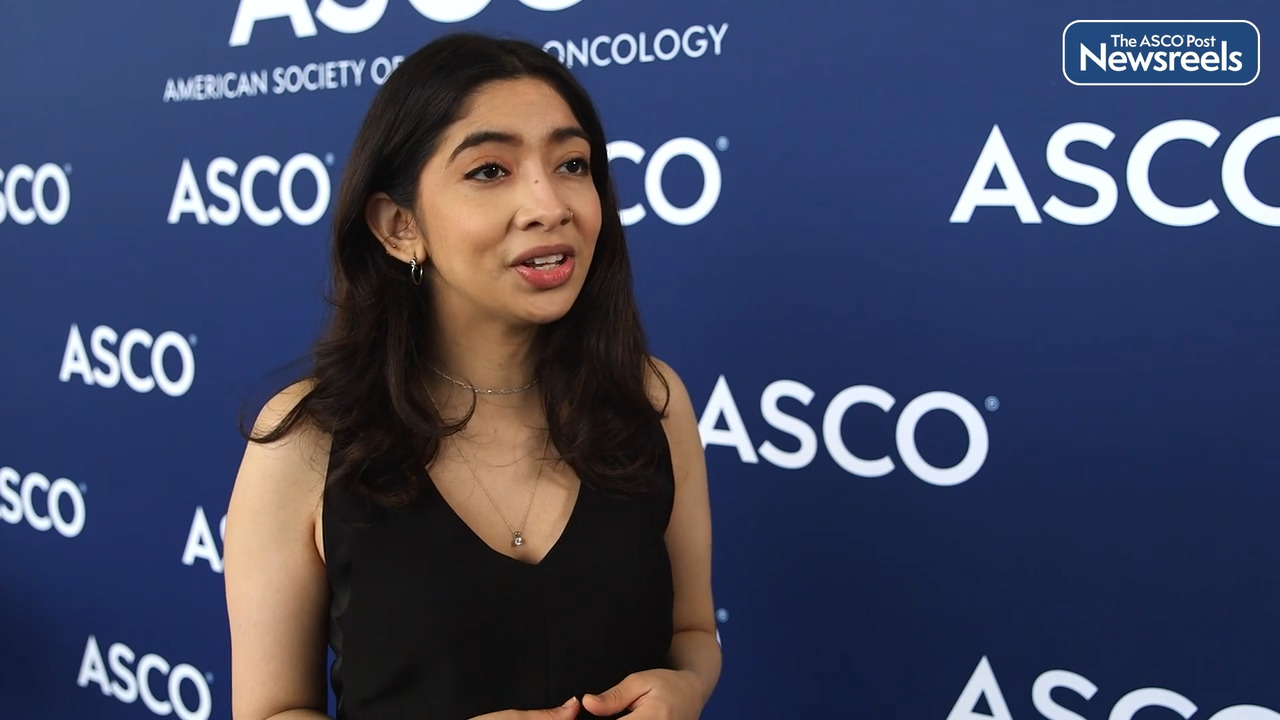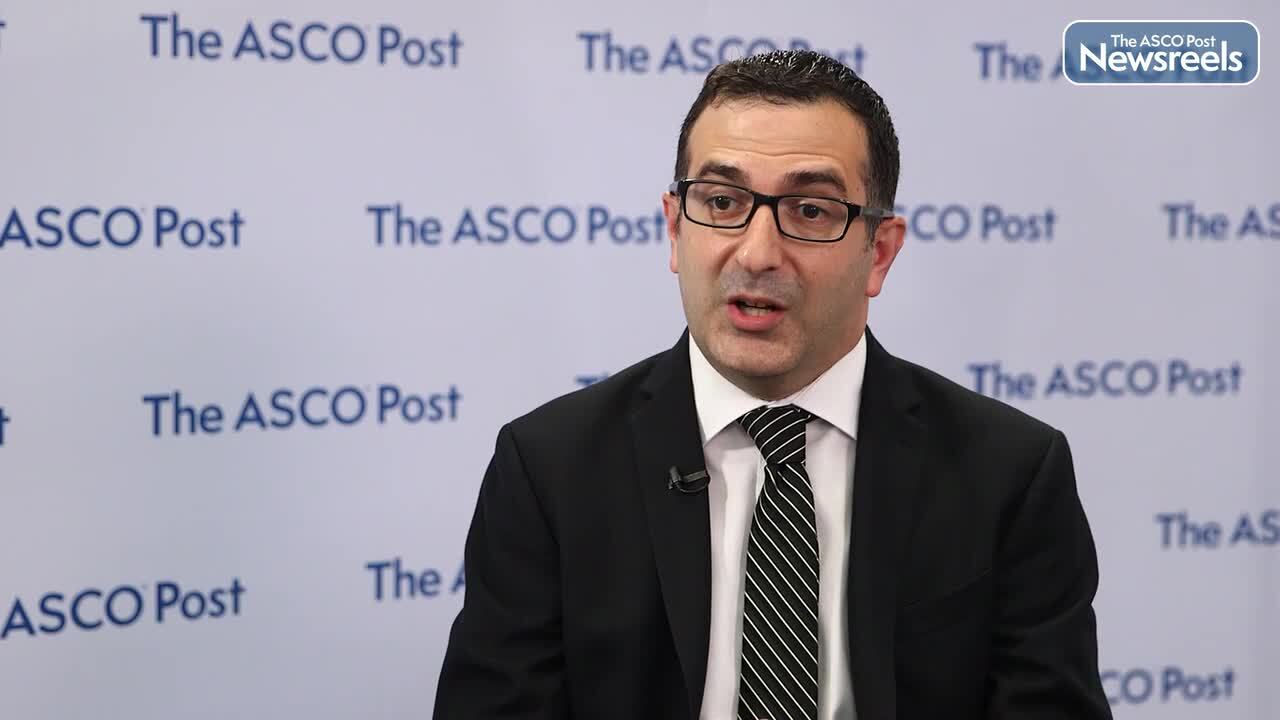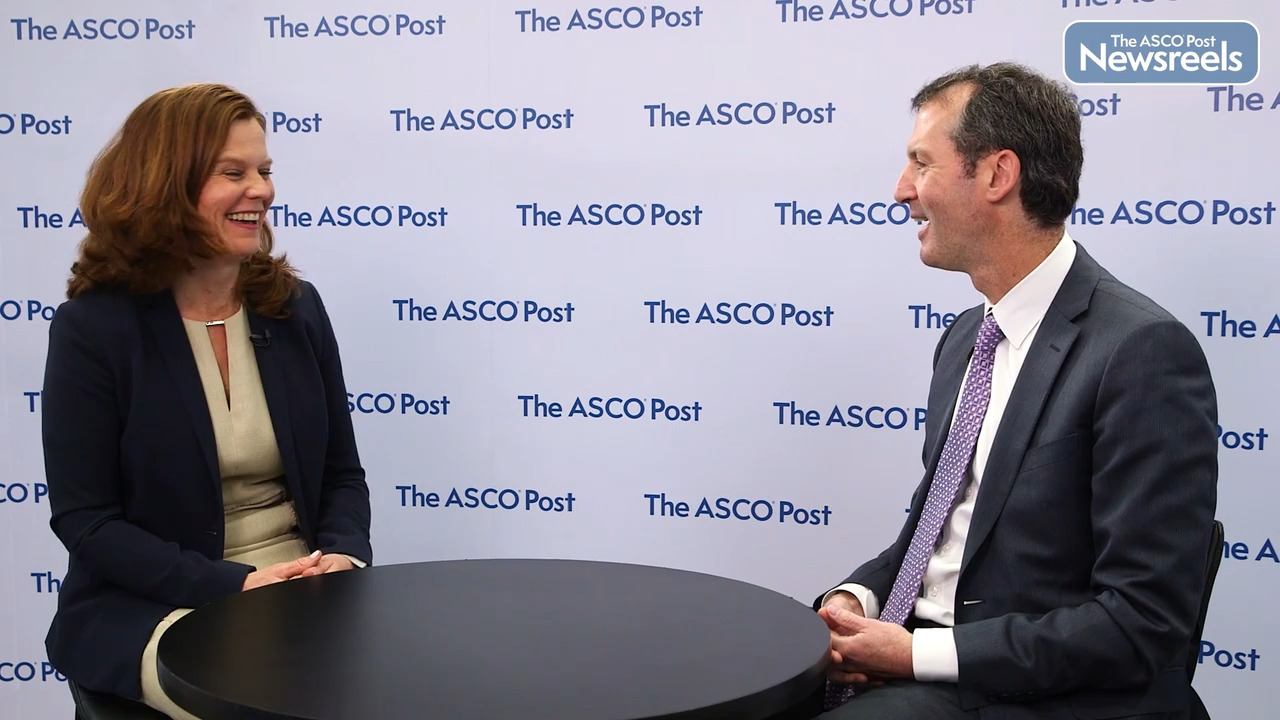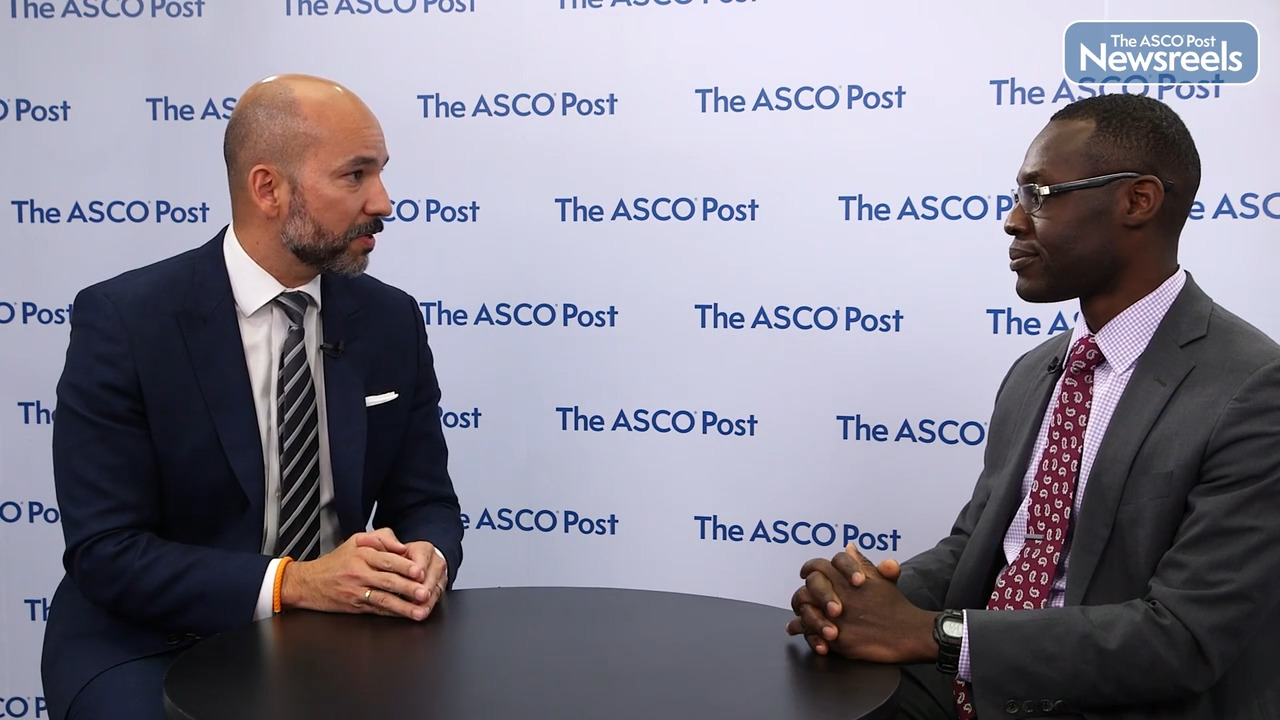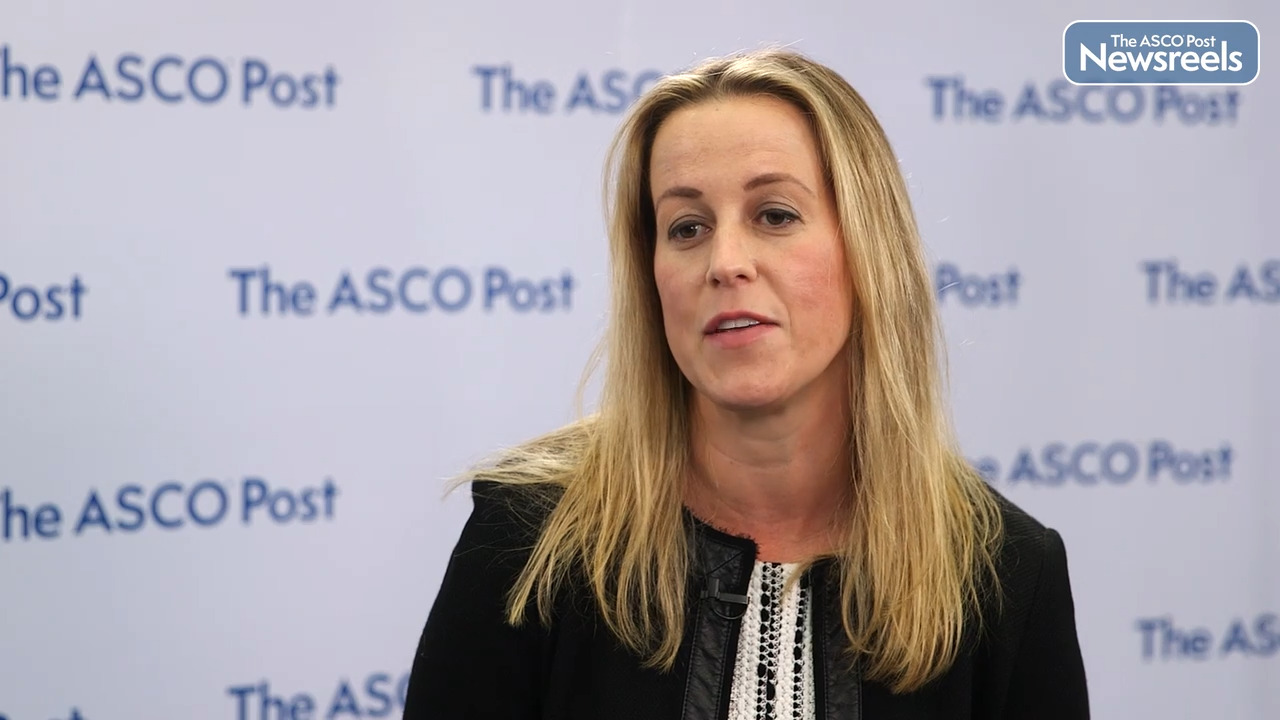Robert Hugh Jones, MD, PhD, on Breast Cancer: Updated Overall Survival Data on Fulvestrant Plus Capivasertib
2022 ASCO Annual Meeting
Robert Hugh Jones, MD, PhD, of Cardiff University and Velindre Hospital, discusses results from an updated analysis of the FAKTION trial, which showed improved overall survival with fulvestrant plus capivasertib in women with metastatic estrogen receptor–positive breast cancer whose disease had relapsed or progressed on an aromatase inhibitor. The benefit may be predominantly in patients with PIK3CA/AKT1/PTEN pathway–altered tumors, a topic researchers continue to study in the phase III CAPItello-291 trial (Abstract 1005).
Transcript
Disclaimer: This video transcript has not been proofread or edited and may contain errors.
So the FAKTION trial is a randomized phase two trial that compares the activity of a hormone therapy called Fulvestrant plus capivasertib, which is an AKT inhibitor, compared to Fulvestrant and placebo in patients with oestrogen-receptor-positive, HER2-negative breast cancer, which is incurable. So patients with metastatic disease. and what we did in the first instance is we randomized patients one to one to get either Fulvestrant plus capivasertib or Fulvestrant plus placebo. And in the first instance, we looked at progression-free survival in the intention to treat population. This was reported around three years ago, and it showed that patients who got the capivasertib had a survival or progression-free survival of around about 10.3 months compared to 4.8 months, if you got the Fulvestrant plus placebo. At that time, we did some limited biomarker analysis to see were the patients who had an activated pathway with PI3-kinase mutations were more likely to get benefit from those than those patients that didn't have an activated pathway. At that time, there was no difference between the two groups. So the advantage you couldn't distinguish which patient groups were going to get the most advantage. What we've now done is we've waited some time and done further analysis. So what we are looking at now is overall survival and looking at a more extensive biomarker analysis. And what we found most importantly was patients not only experienced longer time to control their cancer in the capivasertib group, but they had a longer overall survival. So within unselected patient groups that was around about six months, it was 29 months compared with 23 months. But when we did the biomarker analysis, we identified a greater number of patients that had what we call an altered pathway. So around about 54% of patients had an altered pathway. And when we looked at those patients, they were the ones that got the most benefit. So in terms of overall survival, patients with an activated pathway had around about 39 months worth of life. Whereas patients who had an activated pathway, but got placebo only had around 20 months when we looked at the patients that didn't have an activated pathway, there was very little difference between the two groups. So there was no particular benefit in getting the extra capivasertib drug. And what that means is that we can now select patients out who are most likely to benefit from this new treatment. It is a phase two study. So on its own, it won't change practice, but we have right behind it, a phase three study called CAPItello, and that will be looking at a much larger group of patients. And what we can then see is whether this large group of patients get a similar benefit. The other thing to mention is that because FAKTION was recruiting a number of years ago, patients weren't getting CDK4/6 inhibitors before entry into the study standard practice has now changed. And therefore the phase three study that's following on will look at that group of patients that are getting CDK4/6 inhibitors. And therefore it'll be more representative of real life data. We hope the phase three study repeats the incremental benefits that we've seen in the phase two. And that in turn could lead to a change in practice.
Related Videos
The ASCO Post Staff
Jenny S. Guadamuz, PhD, of Flatiron Health, discusses the use of telemedicine services in community oncology clinics for patients initiating treatments for 21 common cancers during the COVID-19 pandemic. Black, uninsured, non-urban, and less affluent patients were less likely to use telemedicine services. Although telemedicine may expand access to specialty care, the proliferation of these services may widen cancer care disparities if equitable access to these services is not ensured, according to Dr. Guadamuz (Abstract 6511).
The ASCO Post Staff
Rami Manochakian, MD, of Mayo Clinic Florida, discusses the phase II findings of the NADIM II trial, which confirmed that, in terms of pathologic complete response as well as the feasibility of surgery, combining nivolumab and chemotherapy was superior to chemotherapy alone as a neoadjuvant treatment for locally advanced, resectable stage IIIA non–small cell lung cancer (Abstract 8501).
The ASCO Post Staff
Ann H. Partridge, MD, MPH, Dana-Farber Cancer Institute, and Ian E. Krop, MD, PhD, of Yale Cancer Center, discuss phase I/II findings on patritumab deruxtecan, a HER3-directed antibody-drug conjugate, in patients with HER3-expressing metastatic breast cancer. A pooled analysis showed antitumor activity in women with HR-positive/HER2-negative and HER2-positive advanced disease, as well as triple-negative breast cancer (Abstract 1002).
The ASCO Post Staff
Gilberto de Lima Lopes, Jr, MD, MBA, of Sylvester Comprehensive Cancer Center at the University of Miami, and Oladimeji Akinboro, MD, MPH, of the U.S. Food and Drug Administration (FDA), discuss a data analysis, which suggests that most subgroups of patients with advanced non–small cell lung cancer with a PD-L1 score of 50% or greater who are receiving FDA-approved chemotherapy/immunotherapy regimens may have overall survival outcomes comparable to or better than immunotherapy-alone regimens (Abstract 9000).
The ASCO Post Staff
Erika Hamilton, MD, of Sarah Cannon Research Institute at Tennessee Oncology, discusses phase III data from the DESTINY-Breast03 study, which reinforced the consistent safety profile of fam-trastuzumab deruxtecan-nxki (T-DXd) vs ado-trastuzumab emtansine (T-DM1) in patients with HER2-positive unresectable and/or metastatic breast cancer. The findings also support T-DXd’s risk benefit over that of T-DM1 (Abstract 1000).
